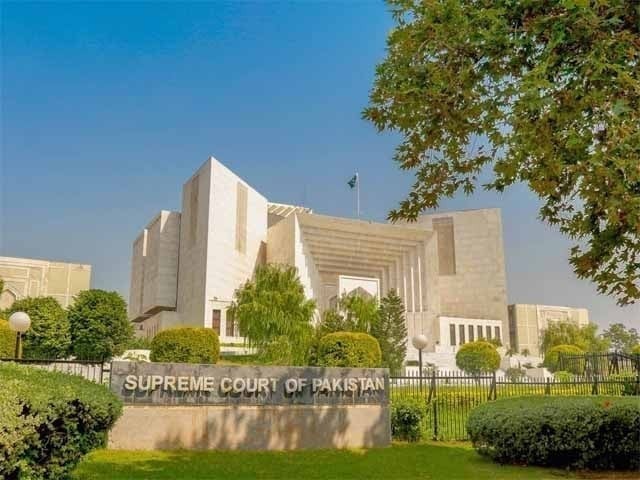——– Terms Marriott’s criticism transparency “unfounded”, “unjustified”
——– Says Pakistan’s judiciary acknowedged, addressed mistakes made in past
——– Marriott urged Pakistan stakeholders to nurture “vibrant democracy”
Staff Report
ISLAMABAD: The Supreme Court has severely criticised British High Commissioner to Pakistan Jane Marriot’s recent speech targeting the South Asian nation’s general elections in 2024, calling on the UK to learn from past mistakes and move on.
In a speech during the Asma Jahangir conference last month, Marriot while quoting British Foreign Sec-retary David Cameron raised concerns about Pakistan’s February 8 elections.
“…not all parties were formally permitted to contest the elections and that legal processes were used to prevent some political leaders from participation, and to prevent the use of recognisable party symbols,” Britain’s top diplomat had said.
She then noted that Pakistan’s government, civil society, and global players should work to nurture an “open society” and “vibrant democracy” as open societies are transparent.
The top court’s registrar, in a letter to the envoy, said that her criticism of a certain political party being sidelined by stripping it of its symbol was unfounded as it did not follow the law.
The letter, drawing attention to the court’s role, said elections were required to be held within 90 days of the completion of the tenure of the national and provincial assemblies. However, they did not take place because then-president Arif Alvi and the Election Commission of Pa-kistan (ECP) were at odds regarding who was empowered to announce the election date.
“The matter was resolved in just 12 days by the Supreme Court, and general elections were held throughout Pakistan on 8 February 2024,” the registrar said. Previously, it mentioned, that many wanting to contest elections in Pakistan faced a lifetime ban be-cause they were not considered honest and trustworthy (Sadiq and Ameen) by the Supreme Court.
However, a larger seven-member bench overruled the earlier decision, it said, holding that it did not conform to the Constitution and the law.
The registrar said that the law enacted by Parliament (Elections Act, 2017) requires democracy within political parties via the holding of periodical intra-party elections; to forestall autocracy or even dicta-torship within them.
To ensure compliance with this democratic principle the law stipulates, it said, that if a political party does not hold intra-party elections, then it would not be eligible for an election symbol.
“A political party (which had itself voted in this law) did not hold the mandated intra-party elections. The Supreme Court reiterated what the law stipulated,” the letter said.
Therefore, the registrar said: “…your Excellency’s criticism with regard to this decision, with utmost respect, was unjustified”.
It is worthy to mention that it was upon the current chief justice’s assumption of office that cases of public importance began to be broadcast live for the first time in Pakistan’s history. This allowed the public at large to view Supreme Court proceedings in their entirety, with transparency in regard to how decisions came to be made. The decision regarding intra-party elections and party symbols was one of many to be broadcast live as such.
Updating Britain regarding a recent ruling, it stated: “It was gratifying that your Excellency had repeat-edly stressed the importance of open societies’ which you stated are necessary for vibrant democra-cies. You will be pleased to learn that the Supreme Court has recognised the right to information and vigorously applied it to itself; a copy of its decision is attached as ‘D’”.
“Persisting in the violent undemocratic mistakes of the past condemns present and future genera-tions, and perpetuates cycles of violence. Let us embrace truth, which sets us free,” it added.
Raising some questions, the top court’s letter read: “Should the overthrow of the elected democratic government of Mohammad Mossadegh in 1953, to capture Iranian oil, not be revealed after over sev-en decades of cover-up? Will this not prove therapeutic for the perpetrator and the victim? Will it not engender trust, possibly friendship, and peace?”
“Ceding to what it described as ‘Jewish Zionist aspirations’, the British government wrote to an individ-ual, its own citizen, on 2 November 1917 conveying its decision to establish a settler-colonial state. This decision was not voted upon by the people of the area who were impacted by it, nor even by your own. The British government, and not Parliament, unilaterally decided it. The Balfour Declaration be-came the foundation on which an ethnic state was established. Those who had always lived there were excluded from this ethnic state; contained in ghettos, humiliated, deprived, brutalised, maimed and killed.”
Let us step back from the precipice of settler-ethnic superiority. Deaths of thousands of children and many thousands more innocents may unjustifiably come to define a people, which would be an abom-ination. Let us all stand up and be counted for equality, peace and humanity, the apex court stressed.
“Let us be honest and acknowledge past mistakes in the spirit of openness, advocated by your Excel-lency. And, jettison the unholy concept of ethnic superiority, and its concomitant humanity — an infe-rior humanity.”
“The Supreme Court of Pakistan has acknowledged the mistakes made in its past, addressed them in detail, and taken steps to ensure that they are not repeated. Since the Government of His Majesty King Charles III has stressed the need for open societies and democracy, and offered criticism on the decisions of the Supreme Court of Pakistan, reciprocity would presumably be acceptable.”
“This letter is written on instructions of the Chief Justice of Pakistan, who extends to you and the people of your country his yearning for openness and democracy, and his best regards,” it concluded.




